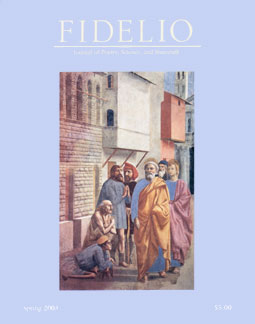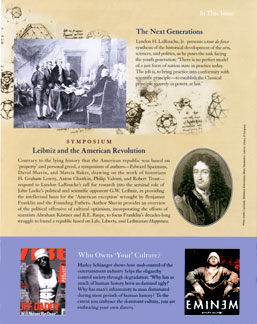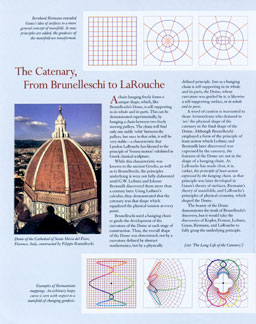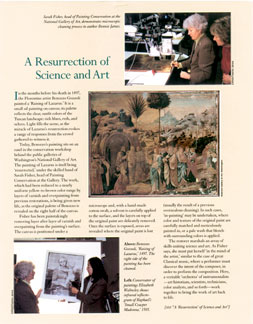
Home | Search | About | Fidelio | Economy | Strategy | Justice | Conferences | Join
Highlights | Calendar | Music | Books | Concerts | Links | Education | Health
What's New | LaRouche | Spanish Pages | Poetry | Maps
Dialogue of Cultures
FIDELIO
Journal of Poetry, Science, and Statecraft
Spring, 2003 Vol XII, No.1
PDF Archive
full issue, plus PDFs of each article


FRONT COVER
BACK COVER


Front Inside Cover
The Catenary, From Brunelleschi to LaRouche
Back Inside Cover
A Resurrection of
Science and Art
FIDELIO
Table of Contents
“It is through beauty that one proceeds to freedom.”
—Friedrich Schiller
Spring 2003
|
The Next Generations
Lyndon H. LaRouche, Jr. 4 SYMPOSIUM: LEIBNIZ AND THE AMERICAN REVOLUTION 32 Leibniz, Halle, and The American Revolution Edward Spannaus 33 |
Leibniz to Franklin
On ‘Happiness’ David Shavin 45 Franklin’s ‘Lunar Society’ and The Industrial Revolution Marcia Merry Baker 74 Preface to Leibniz’s New Essays on Human Understanding Abraham Gotthelf Kästner 79 |
||||||||||
| Editorial News Obituary Commentary Pedagogical Art |
2 82 83 84 86 87 88 90 100 111 |
Lyndon LaRouche on Immortality LaRouche State of the Union: ‘Think as Citizens’ India Meetings: Infrastructure Key to Development LaRouche Organizers in Italy, Hungary vs. Crisis LaRouche Returns to Mexico! Youth Movement ‘Invades’ State Legislatures Marianna Wertz Who Really Owns ‘Your’ Culture? The Long Life of the Catenary A ‘Resurrection’ of Science and Art |
|||||||||
Sporting Masaccio's "St. Peter Healing with His Shadow"—a metaphor for "ideas as power"—on its cover, the spring issue of the Schiller Institute magazine Fidelio is dedicated to the requirement of the growing LaRouche Youth Movement for political organizing material that presents the Classical principle at the highest level.
The intent of the issue, which features a groundbreaking symposium on "Leibniz and the American Revolution," is set forth by Lyndon LaRouche in his essay "The Next Generations," a tour de force synthesis of the historical development of the arts, sciences, and politics. LaRouche poses the challenge before today's youth, if they are to asssume their place in world history:
"There is no perfect model of a just form of modern nation-state in practice today. The principle is clear; but, the practice is contested and usually contradictory. The job is, to bring practice into conformity with scientific principle ... to establish the Classical principle securely in power, at last."
LaRouche highlights the Fundamental Theorem of Algebra, discovered by Carl Gauss, as an example of an idea whose mastery provides an efficient understanding of the difference between formalist "learning," and true knowledge based upon the transformation of reality. - Leibniz and America -
Contrary to the lying history that claims the American Republic was based on "property" and personal greed, the issue's symposium demonstrates the seminal role of John Locke's political and scientific opponent, G.W. Leibniz, in providing the intellectual basis for the "American exception" wrought by Benjamin Franklin and the Founding Fathers:
- Edward Spannaus reports on the trans-Atlantic dialogue between Franklin's mentor Cotton Mather and the Leibnizian educator A.H. Francke.
- David Shavin presents an overview of the political offensive of cultural optimism, incorporating the efforts of the Goettingen circle around Gauss's teacher Abraham Kaestner, to focus Franklin's decades-long struggle to found a republic based on Life, Liberty, and Leibnizian "Happiness."
- Marcia Merry Baker shows that England's Industrial Revolution sprang from the same Leibnizian outlook as the American Revolution.
- The spring Fidelio also includes a pedagogical exercise reviewing Brunelleschi's construction of the Dome of the Cathedral of Florence, from the advanced standpoint of Gauss and Bernhard Riemann.
- - On Immortality -
This issue of Fidelio also contains something else, of great importance. The life of Schiller Institute vice president Marianna Wertz, who died Jan. 15, is celebrated by her husband, Fidelio editor-in-chief Will Wertz, and by editorial remarks on immortality by Lyndon LaRouche. As a tribute to her passing, the Schiller Institute has re-issued "Bridge Across Jordan," the autobiography of Marianna's friend, Civil Rights heroine Amelia Boynton Robinson, with a new dedication written by Mrs. Robinson in Marianna's memory.
schiller@schillerinstitute.org
The Schiller Institute
PO BOX 20244
Washington, DC 20041-0244
703-297-8368
Thank you for supporting the Schiller Institute. Your membership and contributions enable us to publish FIDELIO Magazine, and to sponsor concerts, conferences, and other activities which represent critical interventions into the policy making and cultural life of the nation and the world.
Contributions and memberships are not tax-deductible.
VISIT THESE OTHER PAGES:
Home | Search | About | Fidelio | Economy | Strategy | Justice | Conferences | Join
Highlights | Calendar | Music | Books | Concerts | Links | Education | Health
What's New | LaRouche | Spanish Pages | Poetry | Maps
Dialogue of Cultures
© Copyright Schiller Institute, Inc. 2002. All Rights Reserved.